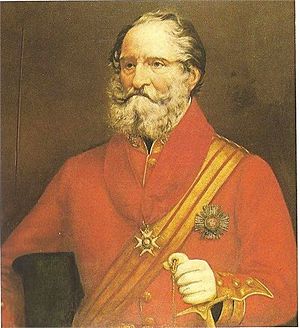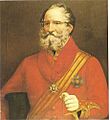Edward Nicolls facts for kids
Quick facts for kids
Sir
Edward Nicolls
|
|
|---|---|

The only known portrait of Nicolls
|
|
| 2nd Superintendent of Fernando Po | |
| In office 4 April 1829 – 29 August 1832 |
|
| Preceded by | William Fitzwilliam Owen |
| Succeeded by | John Beecroft |
| 6th Commandant of Ascension Island | |
| In office 21 March 1823 – 3 November 1828 |
|
| Preceded by | Robert Campbell |
| Succeeded by | William Bate |
| Personal details | |
| Born | Unknown date, c. 1779 Coleraine, Derry, Ireland |
| Died | (aged 85) Blackheath, London, England |
| Awards |
|
| Military service | |
| Branch |
|
| Service years | 1795–1835 |
| Rank | General |
| Conflicts | |
Sir Edward Nicolls (born around 1779 – died February 5, 1865) was a brave officer in the Royal Marines. He was known as "Fighting Nicolls" because he was involved in many battles. His obituary in The Times newspaper said he fought in over 100 actions around the world. He was also injured many times, losing sight in one eye.
Nicolls was born in Coleraine, Ireland. His family had a history of military service. He went to school for two years in Greenwich. At age 11, he joined the Royal Navy. In 1795, when he was 16, he became an officer in the Royal Marines. He quickly started serving on ships.
Nicolls was a very religious person. He strongly believed in ending slavery. He also supported Native Americans and was a leader in the Temperance Society, which encouraged people to drink less alcohol.
Contents
A Life of Service and Courage
Edward Nicolls was a remarkable officer. He was known for his bravery and strong beliefs. His career took him to many parts of the world.
Early Years and Military Beginnings
Edward Nicolls was born in 1779 in Coleraine, Ireland. His father worked for the government, collecting taxes. His mother's father was a church leader. Edward was the oldest of six children. Many of his brothers also had important military careers.
He had a basic education in Coleraine and Greenwich. At just under 16 years old, he became a second lieutenant in the Royal Marines in 1795. He was promoted to first lieutenant a year later.
Fighting in the Napoleonic Wars
Nicolls earned his nickname "Fighting Nicolls" during the Napoleonic Wars. He was an officer on small ships. He often led daring attacks on enemy boats and gun batteries.
- In 1803, he led a small team to capture a French cutter boat. He was severely wounded but showed great courage. For this, he received a special sword of honor.
- In 1804, he led another boat attack. He also helped capture a French-Dutch fort in Curaçao. His men bravely held their positions against many enemy attacks.
- He was promoted to captain in 1805. He continued to fight in important battles. He captured a Turkish flag during the Dardanelles Operation.
- In 1809, his marines helped capture Anholt island from the Danish. Nicolls briefly became the island's military governor.
- In 1810, he was promoted to the rank of major.
The War of 1812 in Florida
During the War of 1812, Nicolls was sent to Spanish Florida. His mission was to recruit Seminole people to fight alongside the British against the United States. He also worked to recruit enslaved people who had escaped. As a strong opponent of slavery, Nicolls put a lot of effort into this.
- He set up a base called Prospect Bluff on the Apalachicola River.
- He built a strong fort there. He formed a special group of soldiers called the Corps of Colonial Marines. This group included both Black and Native American fighters.
- Nicolls's forces fought at Fort Bowyer. They were also present at the Battle of New Orleans.
- The war ended in early 1815. Nicolls returned to Britain. He tried to get his government to support his Native American allies. However, his efforts were not successful.
After the War
After the war, Nicolls tried to help the Native Americans and Black people who had fought with the British. He even tried to create a special agreement, the Treaty of Nicolls' Outpost, between Britain and the Creeks and Seminoles. This treaty would have given British support to the Native American nations. However, the British government did not approve it.
Nicolls was criticized for bringing some Native American leaders to England. But he continued to receive his pay and was honored for his many battle wounds. He was given a pension and another sword of honor.
Commandant of Ascension Island
From 1823 to 1828, Nicolls was the first leader of Ascension Island. This small volcanic island is in the middle of the South Atlantic. The British Navy used it as a supply stop for ships. These ships were working to stop the transatlantic slave trade.
- Water was very scarce on the island. Nicolls worked hard to create a steady water supply. He built pipes and used carts to bring water from mountain springs.
- Food was mostly shipped in. But Nicolls also encouraged local food sources. These included fish, vegetables, and turtle meat.
- Nicolls also oversaw many building projects. He built roads, water tanks, and a storehouse. He also developed gardens on Green Mountain.
- For these projects, he brought freed Africans to the island. He also asked for convicts to help with the work.
- Nicolls had many big ideas for trade. But most of these plans did not happen.
Superintendent of Fernando Po
In 1829, Nicolls was appointed Superintendent of Fernando Po. This tropical island is off the coast of Africa. It was another important base for stopping the slave trade.
- Many Europeans suffered from tropical illnesses on Fernando Po. Many died during Nicolls's time there.
- Nicolls himself became ill and had to leave for a time. But he returned for a second term from 1832 to 1833.
- He was determined to stop the slave trade. He tried to convince the British government to take stronger action.
- He invited West African leaders to Fernando Po. He wanted to form an alliance against slavery.
- To his disappointment, the British government ordered him to leave Fernando Po in 1832. He finally returned to England in 1835.
Protecting Freed People
While on Fernando Po, Nicolls had disagreements with Portuguese leaders. They wanted him to return hundreds of escaped enslaved people who had found safety on the island. Nicolls refused.
- He said he never encouraged enslaved people to escape. But if they chose to come to Fernando Po, he believed it was his duty as a Christian to protect them.
- He believed that enslaved people who fought for their freedom were justified. He would not send them back to slavery.
- He even wrote to The Times newspaper about his beliefs. This was during a time when there was a big debate about enslaved people who took control of a ship to gain their freedom.
Later Life and Honors
Nicolls retired from the Royal Marines in 1835. He continued to receive promotions in his retirement.
- In 1840, he became a colonel.
- In 1846, he was promoted to major general.
- In 1854, he became a lieutenant general.
- In 1855, he reached the rank of full general.
- In July 1855, he was made a Knight Commander of the Order of the Bath (KCB). This is a very high honor.
In 1809, Nicolls married Eleanor Bristow. They had several children. His son, Edward Nicolls, also served in the Royal Navy. He sadly died trying to save another man's life.
Sir Edward Nicolls passed away in London on February 5, 1865, at the age of 85.
Legacy and Impact
Many people remember Nicolls as a very important officer. One historian called him "possibly the most distinguished officer the corps ever had." Even those who disagreed with him admitted he was brave.
Nicholls Town in the Bahamas is named after him. This town was founded by former enslaved people whom Nicolls had helped to free and reach British territory. He truly made a difference in the fight against slavery.
Images for kids
 | Sharif Bey |
 | Hale Woodruff |
 | Richmond Barthé |
 | Purvis Young |


